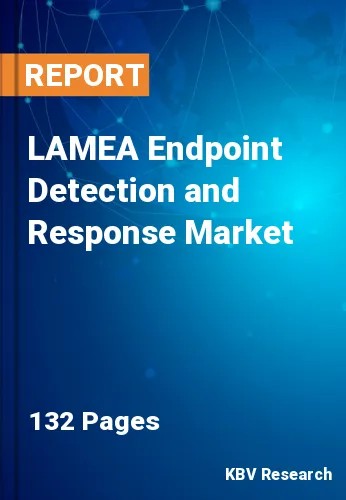The Latin America, Middle East and Africa Endpoint Detection and Response Market would witness market growth of 28.4% CAGR during the forecast period (2022-2028).
Powerful threat protection solutions can automatically thwart over 99 percent of threats. The credibility of the source and signer of a file, the distribution of bytes in the code, and the functionalities in an executable are just a few of the analysis engines they can use to thwart an attack. Since many zero-day attacks employ well-known methodologies, effective security solutions can thwart them even if they have never come across a particular attack before.
The most dangerous and complex attacks, however, demand detection and retaliation. A security analyst may need to manually verify these attacks, including insider threats, low- and slow-speed attacks, and advanced threats. In many cases, machine learning analysis of activity over time and across data sources is the only way to detect these attempts. Rarely are these sophisticated attacks detectable in real-time. A security specialist frequently needs to try to grasp the purpose of the action to tell whether it is malicious or not. Therefore, even while not all attacks necessitate detection and action, they can nevertheless be very devastating. To locate, examine, and stop them, security professionals need EDR solutions.
Since it is a significant hub for industry globalization in the MENA region, the UAE is a competitive business in the information and communication technology (ICT) sector. To lessen reliance on oil revenue and boost the private sector, the Abu Dhabi Economic Vision 2030 and UAE Vision 2021 government programs set out to build a competitive skilled workforce and promote an open, effective, productive, and integrated corporate environment. The UAE government makes numerous attempts to promote the expansion of the knowledge economy. The UAE government has created several free trade zones (FTZs) that are focused on the ICT sector and function as industrial hubs for cutting-edge technology and innovation, including Dubai Silicon Oasis and Dubai Internet City.
The Brazil market dominated the LAMEA Endpoint Detection and Response Market by Country in 2021, and would continue to be a dominant market till 2028; thereby, achieving a market value of $121.2 million by 2028. The Argentina market is experiencing a CAGR of 29.1% during (2022 - 2028). Additionally, The UAE market would display a CAGR of 28.1% during (2022 - 2028).
Based on Vertical, the market is segmented into, IT & Telecom, BFSI, Manufacturing & Automotive, Retail, Government & Public Sector, Healthcare & Life Sciences and Others. Based on Component, the market is segmented into Solution and Services. Based on Deployment Type, the market is segmented into On-premise and Cloud. Based on Organization Size, the market is segmented into Large Enterprises and Small & Medium Enterprises. Based on Enforcement Point, the market is segmented into Workstations, Servers, Mobile Devices, Point of Sale Terminals and Others. Based on countries, the market is segmented into Brazil, Argentina, UAE, Saudi Arabia, South Africa, Nigeria, and Rest of LAMEA.
Free Valuable Insights: The Global Endpoint Detection and Response Market is Predict to reach $7.1 Billion by 2028, at a CAGR of 33.5%
The market research report covers the analysis of key stake holders of the market. Key companies profiled in the report include Broadcom, Inc., Cisco Systems, Inc., Microsoft Corporation, OpenText Corporation, Crowdstrike Holdings, Inc., McAfee Corp., VMware, Inc., Palo Alto Networks, Inc., SentinelOne, Inc., and Cybereason Inc.
By Vertical
By Component
By Deployment Type
By Organization Size
By Enforcement Point
By Country
Our team of dedicated experts can provide you with attractive expansion opportunities for your business.

